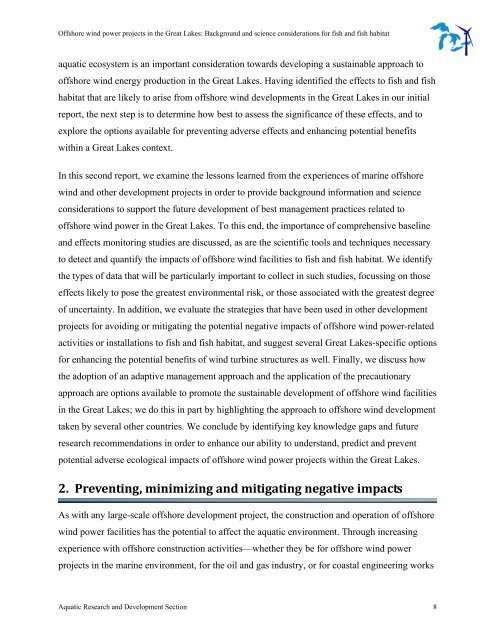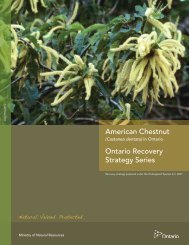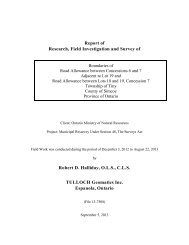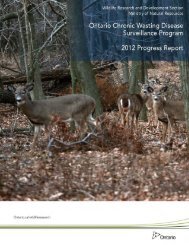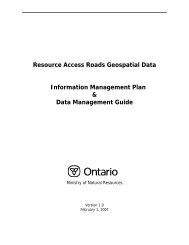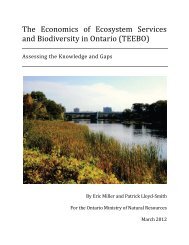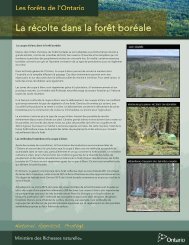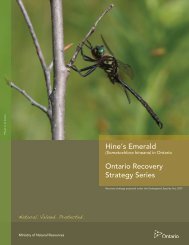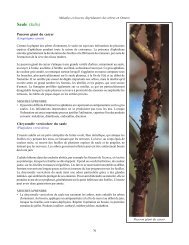Offshore Wind Power Projects in the Great Lakes - Ministry of ...
Offshore Wind Power Projects in the Great Lakes - Ministry of ...
Offshore Wind Power Projects in the Great Lakes - Ministry of ...
Create successful ePaper yourself
Turn your PDF publications into a flip-book with our unique Google optimized e-Paper software.
<strong>Offshore</strong> w<strong>in</strong>d power projects <strong>in</strong> <strong>the</strong> <strong>Great</strong> <strong>Lakes</strong>: Background and science considerations for fish and fish habitat<br />
aquatic ecosystem is an important consideration towards develop<strong>in</strong>g a susta<strong>in</strong>able approach to<br />
<strong>of</strong>fshore w<strong>in</strong>d energy production <strong>in</strong> <strong>the</strong> <strong>Great</strong> <strong>Lakes</strong>. Hav<strong>in</strong>g identified <strong>the</strong> effects to fish and fish<br />
habitat that are likely to arise from <strong>of</strong>fshore w<strong>in</strong>d developments <strong>in</strong> <strong>the</strong> <strong>Great</strong> <strong>Lakes</strong> <strong>in</strong> our <strong>in</strong>itial<br />
report, <strong>the</strong> next step is to determ<strong>in</strong>e how best to assess <strong>the</strong> significance <strong>of</strong> <strong>the</strong>se effects, and to<br />
explore <strong>the</strong> options available for prevent<strong>in</strong>g adverse effects and enhanc<strong>in</strong>g potential benefits<br />
with<strong>in</strong> a <strong>Great</strong> <strong>Lakes</strong> context.<br />
In this second report, we exam<strong>in</strong>e <strong>the</strong> lessons learned from <strong>the</strong> experiences <strong>of</strong> mar<strong>in</strong>e <strong>of</strong>fshore<br />
w<strong>in</strong>d and o<strong>the</strong>r development projects <strong>in</strong> order to provide background <strong>in</strong>formation and science<br />
considerations to support <strong>the</strong> future development <strong>of</strong> best management practices related to<br />
<strong>of</strong>fshore w<strong>in</strong>d power <strong>in</strong> <strong>the</strong> <strong>Great</strong> <strong>Lakes</strong>. To this end, <strong>the</strong> importance <strong>of</strong> comprehensive basel<strong>in</strong>e<br />
and effects monitor<strong>in</strong>g studies are discussed, as are <strong>the</strong> scientific tools and techniques necessary<br />
to detect and quantify <strong>the</strong> impacts <strong>of</strong> <strong>of</strong>fshore w<strong>in</strong>d facilities to fish and fish habitat. We identify<br />
<strong>the</strong> types <strong>of</strong> data that will be particularly important to collect <strong>in</strong> such studies, focuss<strong>in</strong>g on those<br />
effects likely to pose <strong>the</strong> greatest environmental risk, or those associated with <strong>the</strong> greatest degree<br />
<strong>of</strong> uncerta<strong>in</strong>ty. In addition, we evaluate <strong>the</strong> strategies that have been used <strong>in</strong> o<strong>the</strong>r development<br />
projects for avoid<strong>in</strong>g or mitigat<strong>in</strong>g <strong>the</strong> potential negative impacts <strong>of</strong> <strong>of</strong>fshore w<strong>in</strong>d power-related<br />
activities or <strong>in</strong>stallations to fish and fish habitat, and suggest several <strong>Great</strong> <strong>Lakes</strong>-specific options<br />
for enhanc<strong>in</strong>g <strong>the</strong> potential benefits <strong>of</strong> w<strong>in</strong>d turb<strong>in</strong>e structures as well. F<strong>in</strong>ally, we discuss how<br />
<strong>the</strong> adoption <strong>of</strong> an adaptive management approach and <strong>the</strong> application <strong>of</strong> <strong>the</strong> precautionary<br />
approach are options available to promote <strong>the</strong> susta<strong>in</strong>able development <strong>of</strong> <strong>of</strong>fshore w<strong>in</strong>d facilities<br />
<strong>in</strong> <strong>the</strong> <strong>Great</strong> <strong>Lakes</strong>; we do this <strong>in</strong> part by highlight<strong>in</strong>g <strong>the</strong> approach to <strong>of</strong>fshore w<strong>in</strong>d development<br />
taken by several o<strong>the</strong>r countries. We conclude by identify<strong>in</strong>g key knowledge gaps and future<br />
research recommendations <strong>in</strong> order to enhance our ability to understand, predict and prevent<br />
potential adverse ecological impacts <strong>of</strong> <strong>of</strong>fshore w<strong>in</strong>d power projects with<strong>in</strong> <strong>the</strong> <strong>Great</strong> <strong>Lakes</strong>.<br />
2. Prevent<strong>in</strong>g, m<strong>in</strong>imiz<strong>in</strong>g and mitigat<strong>in</strong>g negative impacts<br />
As with any large-scale <strong>of</strong>fshore development project, <strong>the</strong> construction and operation <strong>of</strong> <strong>of</strong>fshore<br />
w<strong>in</strong>d power facilities has <strong>the</strong> potential to affect <strong>the</strong> aquatic environment. Through <strong>in</strong>creas<strong>in</strong>g<br />
experience with <strong>of</strong>fshore construction activities—whe<strong>the</strong>r <strong>the</strong>y be for <strong>of</strong>fshore w<strong>in</strong>d power<br />
projects <strong>in</strong> <strong>the</strong> mar<strong>in</strong>e environment, for <strong>the</strong> oil and gas <strong>in</strong>dustry, or for coastal eng<strong>in</strong>eer<strong>in</strong>g works<br />
Aquatic Research and Development Section 8


